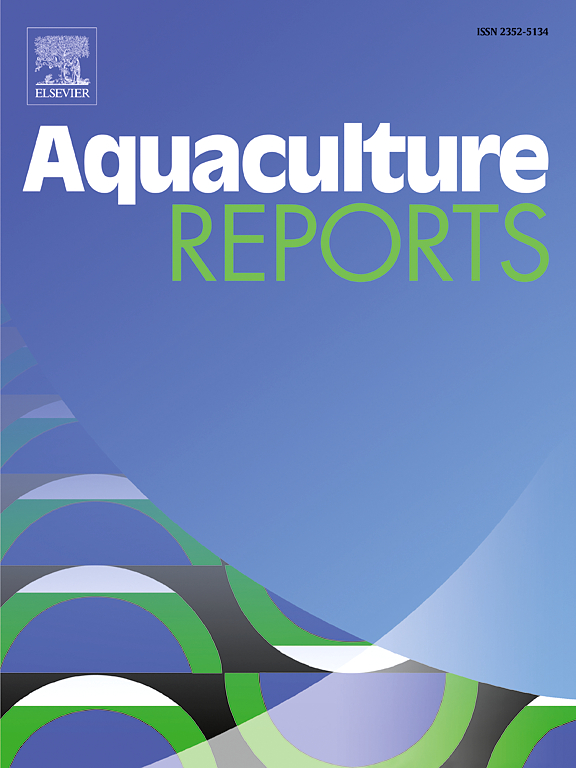WSSV感染对克氏原螯虾免疫、肠道微生物组成及其衍生代谢物合成的影响
IF 3.7
2区 农林科学
Q1 FISHERIES
引用次数: 0
摘要
肠道微生物在疾病的发病机制中起着关键作用,衍生代谢物是关键的介质。WSSV给小龙虾养殖业造成了相当大的经济损失。我们构建了小龙虾WSSV人工感染模型,结合16S rDNA和靶向代谢组学技术,全面研究了WSSV感染后小龙虾的非特异性免疫、肠道微生物结构和功能代谢物的变化。WSSV感染引起氧化应激和肝胰腺损伤。RT-PCR结果显示,WSSV感染导致小龙虾红细胞中与proPO系统(proPO和Crustin)、炎症反应(enjoy、Cox-1和Cox-2)和自噬(LC3和Atg2)相关的基因转录水平显著上调。细胞凋亡相关基因(Caspase3)、凝集素(L-Lectin)和吞噬作用相关基因(Rab5)转录水平显著降低。变形菌门和风单胞菌属的丰度显著增加,而furcosa厌氧菌门和Akkermansia厌氧菌门的丰度显著减少。BugBase预测表明,感染后肠道菌群的致病潜力和氧化应激耐受性增加。目标代谢组学分析显示,受感染的小龙虾食糜中乙酸显著减少,GCDCA显著增加。结果表明,肠道微生物及其特定的功能代谢物醋酸酯和GCDCA参与了小龙虾WSSV感染和免疫动员。本研究为了解WSSV的致病机制和开发新的抗WSSV调节剂提供了新的见解和途径。本文章由计算机程序翻译,如有差异,请以英文原文为准。
Effect of WSSV infection on immunity, intestinal microbial composition and its derived metabolites synthesis in Procambarus clarkii
Intestinal microbes play a pivotal role in the pathogenesis of disease, with derived metabolites acting as key mediators. The WSSV results in considerable economic losses to the crayfish aquaculture industry. We constructed an artificial infection model of WSSV in crayfish and conducted a comprehensive investigation into the alterations in non-specific immunity, intestinal microbial structure, and functional metabolites of crayfish following WSSV infection by integrating 16S rDNA and targeted metabolomics techniques. WSSV infection induced oxidative stress and hepatopancreatic injury. RT-PCR results indicated that WSSV infection resulted in a significant upregulation of the transcript levels of genes related to the proPO system (proPO and Crustin), the inflammatory response (Relish, Cox-1 and Cox-2) and autophagy (LC3 and Atg2) in crayfish hemocytes. Transcript levels of genes associated with apoptosis (Caspase3), lectins (L-Lectin) and phagocytosis (Rab5) were significantly reduced. The abundance of the Proteobacteria and the Aeromonas genus markedly increased, while the Anaerorhabdus furcosa and Akkermansia was significantly diminished in infected crayfish. BugBase prediction indicated the pathogenic potential and oxidative stress tolerance of the intestinal microbiota increased following infection. Targeted metabolomic analyses revealed a significant decrease in acetate and a significant increase in GCDCA in the chyme of the infected crayfish. The results suggest that intestinal microorganisms and their specific functional metabolites, acetate and GCDCA, are involved in WSSV infection and immune mobilisation of crayfish. The present study offers new insights and avenues for understanding the pathogenic mechanisms of WSSV and precise targets for the development of novel anti-WSSV modulators.
求助全文
通过发布文献求助,成功后即可免费获取论文全文。
去求助
来源期刊

Aquaculture Reports
Agricultural and Biological Sciences-Animal Science and Zoology
CiteScore
5.90
自引率
8.10%
发文量
469
审稿时长
77 days
期刊介绍:
Aquaculture Reports will publish original research papers and reviews documenting outstanding science with a regional context and focus, answering the need for high quality information on novel species, systems and regions in emerging areas of aquaculture research and development, such as integrated multi-trophic aquaculture, urban aquaculture, ornamental, unfed aquaculture, offshore aquaculture and others. Papers having industry research as priority and encompassing product development research or current industry practice are encouraged.
 求助内容:
求助内容: 应助结果提醒方式:
应助结果提醒方式:


